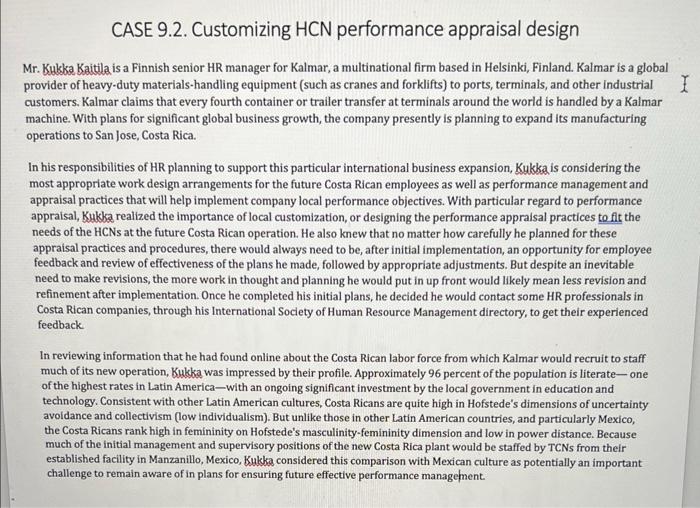CASE 9.2. Customizing HCN performance appraisal design I Mr. Kukka Kaitila is a Finnish senior HR manager for Kalmar, a multinational firm based in Helsinki, Finland. Kalmar is a global provider of heavy-duty materials-handling equipment (such as cranes and forklifts) to ports, terminals, and other industrial customers. Kalmar claims that every fourth container or trailer transfer at terminals around the world is handled by a Kalmar machine. With plans for significant global business growth, the company presently is planning to expand its manufacturing operations to San Jose, Costa Rica. In his responsibilities of HR planning to support this particular international business expansion, Kukka is considering the most appropriate work design arrangements for the future Costa Rican employees as well as performance management and appraisal practices that will help implement company local performance objectives. With particular regard to performance appraisal, Kukka realized the importance of local customization, or designing the performance appraisal practices to fit the needs of the HCNs at the future Costa Rican operation. He also knew that no matter how carefully he planned for these appraisal practices and procedures, there would always need to be, after initial implementation, an opportunity for employee feedback and review of effectiveness of the plans he made, followed by appropriate adjustments. But despite an inevitable need to make revisions, the more work in thought and planning he would put in up front would likely mean less revision and refinement after implementation. Once he completed his initial plans, he decided he would contact some HR professionals in Costa Rican companies, through his International Society of Human Resource Management directory, to get their experienced feedback In reviewing information that he had found online about the Costa Rican labor force from which Kalmar would recruit to staff much of its new operation, Kukka was impressed by their profile. Approximately 96 percent of the population is literate-one of the highest rates in Latin America-with an ongoing significant investment by the local government in education and technology. Consistent with other Latin American cultures, Costa Ricans are quite high in Hofstede's dimensions of uncertainty avoidance and collectivism (low individualism). But unlike those in other Latin American countries, and particularly Mexico, the Costa Ricans rank high in femininity on Hofstede's masculinity-femininity dimension and low in power distance. Because much of the initial management and supervisory positions of the new Costa Rica plant would be staffed by TCNs from their established facility in Manzanillo, Mexico, Kukka considered this comparison with Mexican culture as potentially an important challenge to remain aware of in plans for ensuring future effective performance management 2. What particular plans for Costa Rican performance appraisal likely would work well (for example, how appraisal is conducted, who provides performance feedback, team versus individual performance focus, emphasis on development versus achievement, and so on)








